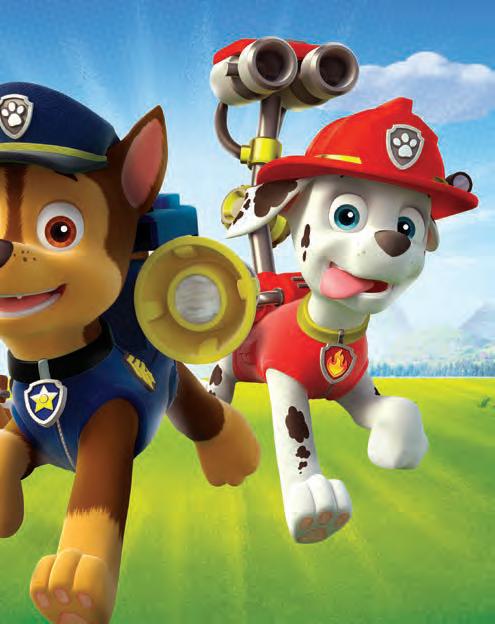
9 minute read
#OmniaTuesday OC Mark Kingston License for Fun...
License for Fun...
AN INTERVIEW WITH MARK KINGSTO

(OC 1984 – 1995)

Mark is Senior Vice President International Licencing for Viacom International Media Networks which owns Nickelodeon, MTV, Comedy Central, Paramount Studios and Channel 5. Here he talks about his memories of Caterham School and his career in the fast moving world of media.
You attended Caterham School from 1984-1995. What first brought you to Caterham School? And what were your first impressions of the school? What was it like studying and boarding at Caterham then? My Uncle, Reverend Derek Kingston, knew Stephen Ryder Smith, Caterham’s Headmaster, as they had gone to university together and were both missionaries in the Far East during the 1960’s. Through this connection and family circumstances, my brother and I secured assisted places at Caterham.
My first day was one of excitement and nervousness. I remember being driven along the sweeping driveway to Mottrams with my trunk and tuckbox and being met by Mr and Mrs Hawkins. I was only seven years old but before long I was enjoying boarding life and throwing myself into all activities.
Caterham was stricter and more regimented than it is nowadays, and had few creature comforts. But in some ways life was freer and we didn’t have digital devices to distract us from exploring the outdoors. We wandered far and wide throughout the woods surrounding the school, up to as far as the newly built M25. There was a badgers’ tunnel beneath it through which we dared each other to go – a badge of honour was to wade through it and get a souvenir from the other side to prove you had been. We also used to slide down the chalk pit by View Point.
Once a week we were allowed to go down to the village to spend what little pocket money we had on sweets. A friend and I were quite entrepreneurial – we would buy tuck and wait until there was ‘high demand’ on a Saturday night when we could sell them for three times the price we had paid for them!
Moving up to senior school felt seamless. I had outgrown the prep school and was ready to become a small fish in a bigger pond. There were plenty of ups and downs and practical jokes and the boarding house had a fairly international feel, particularly in the Fifth and Sixth form where many boys were from Malaysia.
I was delighted to be voted Head boy in 1994, which was the year before Caterham merged with Eothen School. My year as Head Boy saw preparations for the merger and the transition of Headmaster from Mr Smith to Mr Davey who started midway through the spring term. It was an exciting time for Caterham School.

What is your favourite memory of your time at Caterham School, and why? Put quite simply: the setting and the friendship bonds. Being able to wake up every morning and look across the valley and over to the woods was wonderful.
Looking back how would you describe your experience here? What do you think your time at Caterham enabled you to achieve? I look back on my time at Caterham with real fondness. I made lifelong friendships and benefited from an excellent and rounded education I wouldn’t have otherwise received. I felt privileged to be there. Academically I didn’t start out as the smartest. But by the time I got to my GCSEs and A levels I was doing well.
Being at Caterham provided me with the confidence and faith to trust in my own abilities and never be afraid to try something. Being part of a boarding community also meant I had to learn how to live with others and adapt and flex my style. Being
Mark and Snoop Dogg

able to speak my mind, work with different personalities and have confidence in my own abilities has been critically important as I have moved ahead and forged my career.
You studied at Leeds University and secured a BSC (Hons) in Animal Sciences – what led you to the world of media? During my degree studies I considered becoming a vet but realised that five more years of academia, bearing in mind tuition fees had started, was not going to work! I went back to live on a family farm in Essex and considered a career in farming. But the farm wasn’t viable and I had student debts to pay off.
Everyone at that time was talking about the millennium bug and an industry had been built around training programmers to deal with it. I took a job at a small IT training company in the East End selling training courses. Each day I got the train from Essex into London, and one day happened upon a copy of The Grocer magazine that had been left

on a seat. At the back of the magazine I saw a job advertisement inviting graduates to apply for sales roles at Mars Confectionery. I applied and was successful – and became a regional salesman visiting supermarkets around the Southeast of England. Mars provided amazing training and I progressed onto the Tesco Account team. During this time I was seconded to Tesco Head Office as a confectionery consultant for six months, before becoming a National Account Manager. It was a great place to learn about brands, retail and sales.
From there I was head-hunted to join BBC Worldwide. The BBC was going through the process of a charter renewal at the time and BBC Worldwide was required to become a bigger revenue contributor to reduce the burden on the TV license payer. I joined the publishing team there at a fascinating time – it was the era of the rise of celebrity chefs such as Delia Smith, Rick Stein, Gary Rhodes along with children’s hits like the Teletubbies and The Tweenies.
In 2003 I joined The Walt Disney Company to build up their retail team within Disney Consumer Products. This meant dealing with retailers such as Woolworths, Toys R Us, Tesco, Asda and other supermarkets on developing licensed products for key Disney franchises such as Winnie the Pooh, Disney Princess, Toy Story etc. Disney didn’t actually manufacture the products but granted licenses to toy, food and clothing companies to produce them in return for paying royalties.
After eight enjoyable years at Disney that saw me travel frequently to LA and working on some amazing movies and TV franchises it felt like the right time to move again. It was at that point that my boss left Disney to join Viacom International Media Networks and rang to say ‘do you remember Teenage Mutant Ninja Turtles? We’ve just bought the franchise and we’re going to re-launch it to a new generation of kids’ – I was sold and joined to help build the Consumer Product team. I am now the Senior Vice President International Licencing and lead a talented and diverse team of over 150 people worldwide.
We sell products around Teenage Mutant Ninja Turtles, Spongebob Square Pants, Dora the Explorer, Paw Patrol, Paramount movies and MTV, generating multi-billions of pounds in retail sales each year. As we don’t physically manufacture the products, we are extremely profitable – with our biggest costs being our people costs. What makes a successful show or movie convert into commercial product sales is notoriously hard to predict and is fundamentally about successfully creating an emotional connection with audiences for them to be willing to purchase products. We plan years ahead and our business revolves around key trade shows and Toy Fairs. We start the New Year with the Hong Kong Toy Fair and roll through various fairs, including the biggest toy fair globally in Nuremburg. The biggest Licensing trade show – Licensing Expo – takes place annually during June in Las Vegas. Walking into a hall of entertainment brands that are big, bold and in your face is truly an explosion on the senses.
What changes have you seen in the mass media industry? And where do you see this industry headed in the next five years? Content rules and always will. We are entering the golden age of television – but television isn’t about traditional viewing on a TV set in the front room anymore. Content can be viewed anywhere – on TV, tablets, smartphones or other devices and we have more access to more content than ever before through more services providers than ever before, whether via traditional broadcasters, subscription services, YouTube etc. As a result there has never been more opportunities to work in the creative industries, there is a huge demand for content creation.
It’s a challenging time however and media companies are likely to consolidate further. The old model of linear TV viewing is challenged as consumers lose patience and want to binge view whole seasons/series of shows. For content creators this is great but for Consumer Product sales this is challenging – launching seasons of children’s content all at once gets great viewing figures but if kids have to wait a year until the next season they move onto something else and don’t build that emotional connection with the content or characters.
Traditional free linear TV content (like Channel 5) or pay TV (like Nickelodeon on SKY) content still works. But audiences are flipping between services and don’t necessarily want to pay for full packages anymore, preferring to pick and choose. There is a generation growing up who don’t want to pay £40/£50 a month when they could pay less and get only the content they want, with the likes of Netflix, Now TV and Amazon Prime providing this flexibility and choice.

What advice would you give to young people who are interested in pursuing careers in global media today? Firstly keep yourself fresh and relevant by keeping up with the latest industry news and trends.
I would encourage that you choose an area (such as content creation or graphic design) and follow experts in


that field. Make full use of social media networking sites and your contacts – including the Caterham School Society platform – to build relationships directly with people in your chosen field. This will be really useful for obtaining work experience and hearing about opportunities. People are often very happy to be contacted and to provide advice.
You received an assisted place to come to Caterham School. Offering bursaries is very important to the School, and we recently launched an appeal to raise funds so we can offer more places. What impact do you feel your assisted place had on your life path? What advice
would you give to future pupils who join Caterham School through the bursary scheme? Having an assisted place gave me the opportunity to have an education I would never have had, and afforded me the ability to build and forge a career and give back to society in ways that I would never have anticipated. I feel very privileged and fortunate to have had that assisted place at Caterham to give me that opportunity.
To future pupils I would say embrace every opportunity you have at Caterham. It’s an incredible school where you can build your confidence, your knowledge base and friendships.

